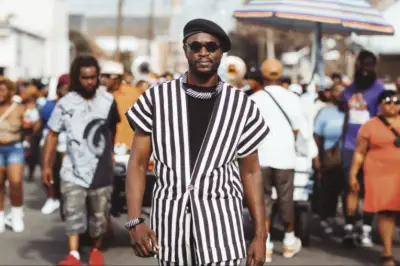Defying labels, Alune Wade shapes his own genre

Alune Wade s face lit up when I urged when he first heard Watermelon Man by jazz legend Herbie Hancock He was years old and living in Senegal the singer multi-instrumentalist composer and filmmaker communicated me as we talked over Zoom I announced Wow That s so beautiful he recalled He d heard the song on a French commercial in the days before the internet and it took him a while to track down the original recording When he conclusively did he was struck by the horns a sound he d constantly felt drawn to as the son of a military-band horn participant Decades later during the COVID lockdown Wade absolutely made his own version of the tune passing files back and forth with musician friends in Cuba New York Brazil Rwanda Cameroon and Senegal That reimagining became the first single off his album New African Orleans disclosed in May On Nov Wade brings the project to the Cedar Cultural Center where audiences will see a -minute cut of his documentary Tukki From Roots to Bayou co-directed with French filmmaker Vincent Le Gal before Wade takes the stage with his band With a photobook arriving this spring the broader project traces the trans-Atlantic story through food music and spirituality As a kid Wade didn t divide the world into categories like jazz Afrobeat or pop I just craved to listen to music he noted His mother favored Malian and traditional Senegalese music his sisters gravitated toward French and American pop his uncles played Miles Davis and reggae from Peter Tosh or Bob Marley his father listened to Beethoven Bach and Ravel Related Amid grief Minneapolis rockers Poli a set to release new album grounded in gratitude Wade has lived in Paris for nearly two decades having left Senegal in with plans to set up meetings for his first album But once he arrived the city s dense artistic ecosystem took over He kept meeting musicians getting invited on gigs and finding new collaborators Gradually France became home In Paris he has crossed paths with artists from Austria Brazil the United States and far beyond collaborating with top jazz figures like Marcus Miller and Joe Zawinul of Weather Account It s easier for me to live in Paris because that s helped me a lot to have those connections between continents he explained There s just like more people from all over the world in Paris As a young man he had dreamed of studying at Berklee College of Music in Boston but his family ultimately decided it was too expensive How Alune Wade became what he heard Wade says his musical style has grown through this steady stream of encounters It s like when you eat food we become what we eat he commented As a musician we become what we hear His collaborations have pulled in groove funk and jazz idioms from across the globe That s why people cannot yet find a name for my music he mentioned Sometimes he sings in the style of a Senegalese or Malian griot sometimes he sounds like a crooner sometimes he channels Nigerian musical vocabularies despite not being Nigerian himself I never put borders around music he noted Because when you say to someone my music is jazz you just limited his vision of what you are playing I just play my music and let the people describe what they think my music is His partnership with Le Gal on Tukki From Roots to Bayou deepened that boundary-breaking approach The film explores the musical and spiritual connections between West Africa and New Orleans Its origins trace back to when Wade organized a jazz festival on Gor e Island in Senegal bringing in musicians from Martinique Mali France and the United States The idea was to create a space for artists of the African diaspora to return to the land and reconnect with their roots A kinship with New Orleans Gor e once the largest slave-trading center on the African coast made the experience especially charged The festival clarified for Wade that it was time to look across the Atlantic That conversation accelerated when Marcus Miller recruited him in to work on Afrodeezia an album exploring African roots from an African American perspective Wade became interested in the reverse journey as someone born in Africa he wished to explore African branches in the United States We have countless similarities between West Africa and the United States particularly New Orleans he stated pointing to food voodoo spirituality and music It was a moment to shine a light on what we share with Americans Related Artist Hawona Sullivan Janzen uses salt as a way to connect to the past in new exhibit The film begins in Nigeria moves on to Dakar and Saint-Louis in Senegal then travels to New Orleans before moving across the Atlantic again to Ghana Wade and Le Gal are presently submitting the feature-length documentary to festivals while also using a -minute version for music engagements including their upcoming appearance at the Cedar Cultural Center Wade says he feels a natural kinship with communities in New Orleans They love family he revealed They want to get the love from other people They love when they know people love them and people give them respect we are like that in Senegal While filming he was struck by how various people yearned to help and how often he d meet someone who looked uncannily like a member of his own family They are like my sisters like they just left Africa the day before today but they didn t even know where Senegal was The experience reinforced the purpose of his wider project to make our history or American history more rich and more beautiful he stated An Evening with Alune Wade takes place at p m Nov at Cedar Cultural Center advance show More info here The post Defying labels Alune Wade shapes his own genre appeared first on MinnPost

